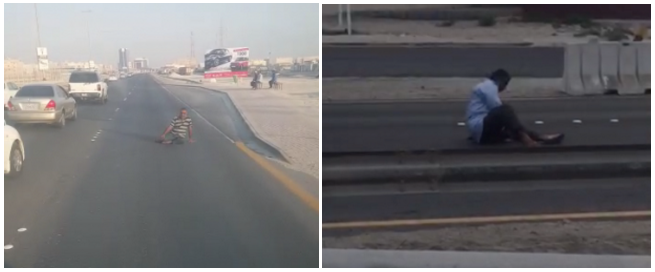
This is not an ordinary image. This is an image that has been popping up in multiple videos on the internet of migrant workers in the Gulf attempting suicide. It is a story of structural violence against one of the most exploited and abused populations in the world. Rather than gaining sympathy, these videos are often passed around by citizens of the Gulf as spectacles of the deranged pathology of the "other." The person behind the camera gawks at a man in one of his most desperate moments, commenting about how he's holding up traffic, shocked at why he would do such a thing. In another instance, a company that had withheld a Filipino worker's wages for four months attributed his suicide to a "serious illness," rather than acknowledge their role in plunging the man's life into uncertainty and vulnerability. These videos and stories uphold a narrative by many people in the Gulf that the migrants who build their buildings, clean their homes, and service them are weak, unstable, and worth infantilizing, and thus worth exploiting for their services without consequence.
What kind of horrific conditions lead to these desperate acts? In the past two months alone, nine workers took their lives in Qatar. Every time, it’s painted as shocking, or extreme, or brushed off as a labor dispute. Even worse, some stories frame it as a result of some innate weakness in these workers. In reality, the migrant workers in the Gulf face some of the harshest conditions of employment in the world, and it is these structural abuses that lead many migrant workers to view suicide as the only option. They are not unique. If put in their position, and faced with the same level of abuse, many people would find themselves struggling to find the will to move on. Workers face exploitation from the very beginning of their employment to the time they return home. They are often deceived as to the terms of their employment, and have their government documents confiscated once they arrive. Their pay is often withheld or delayed, and they are often isolated from a support network and live in harsh environments. In the course of their employment, they routinely face long hours under deplorable conditions.
Suicide isn't the only threat that migrant workers face. Workers have been killed in construction sites, or in factory fires. In one year, 285 migrants were killed in Saudi Arabia due to a lack of sufficient safety measures. The state often limits or prohibits any attempts to seek recourse within the legal system, and in any case, the workers often aren't allowed enough time off or given resources by the same employers that they want to raise a grievance against, or they are even explicitly lied to about the options that they have available.
In 2014, Amnesty International released a damning report about deceptive employment practices that exposed foreign domestic workers to particular vulnerabilities and risk of exploitation. Researchers collected testimonies of violent physical and sexual abuse, and women in particular were often lied to and told that they would be given good salaries and decent working conditions. In addition to abuse from their employers, these workers also often found themselves working long hours on little sleep, with few opportunities for personal time outside the control of their employer. Qatar, for example, has no limits on working hours for domestic workers, and they have no right to a day off. In an abusive situation, these women have no course of action but to flee, since their employer controls everything about their sponsorship, and they often face deportation given the lack of legal recourses in Gulf countries.
The abuse of millions of people does not happen in a vacuum. Gulf-based media often depicts racist and degrading caricatures of migrant workers, portraying them as untrustworthy, violent, and simple-minded. These stereotypes are rooted in a broader racism and xenophobia that grip the Gulf, and helps hide the abuse that migrant workers continue to face. Mental health issues aren't easy for anyone in the Gulf to address, migrant or native, because of the enormous stigma and misunderstanding that are still attached to mental health. But when Gulf citizens constantly produce and consume these racist stereotypes of migrant workers that dehumanize them, it becomes even more difficult to defend and address the needs of migrants in the Gulf before they resort to suicide.
One Nepali woman told a journalist the story of her cousin, who survived a war only to "[work] so hard, he went crazy." He committed suicide after six months of hard labor. She added, "At least during the war we were in our own place, breathing our air, drinking our water." In the broader conversation about migrant rights, it is often forgotten that these people are migrants, away from their families, and carrying with them memories of a homeland that has itself been a site of conflict. These struggles alone carry with them a severe impact on a person's mental and spiritual well-being, and that negative impact is amplified by harsh work environments and abusive employers.
Other than the nine suicides in Qatar just this year, there is a reason why 66% of suicides in Saudi Arabia were by non-Saudis, and why 56% of suicides in Kuwait were by domestic workers alone. It is not because Indians or Nepalese or other groups that send their people to work in the Gulf are more susceptible to mental illness. Nor are these suicides a result of individual circumstances, or family problems. What makes these suicides such an urgent issue is that they are a result of systematic, structural violence. Across all Gulf states, migrant workers take their lives only because they are forced to work in a society that denies them a life to begin with.




